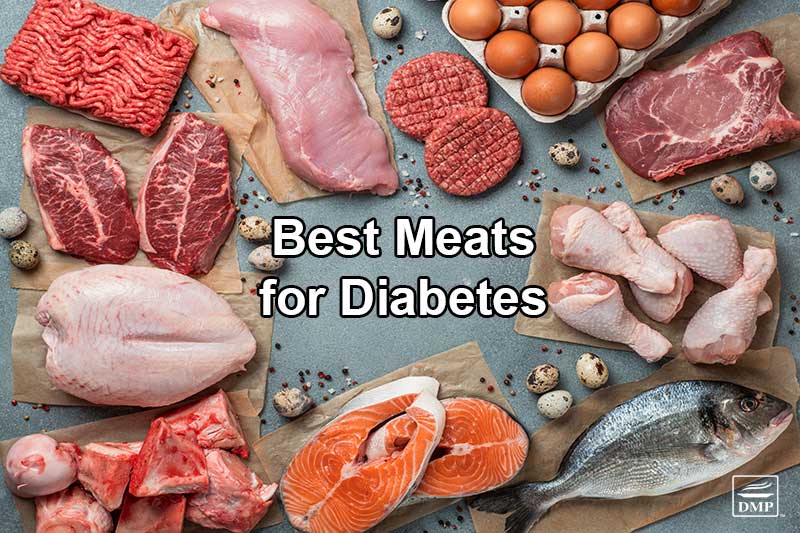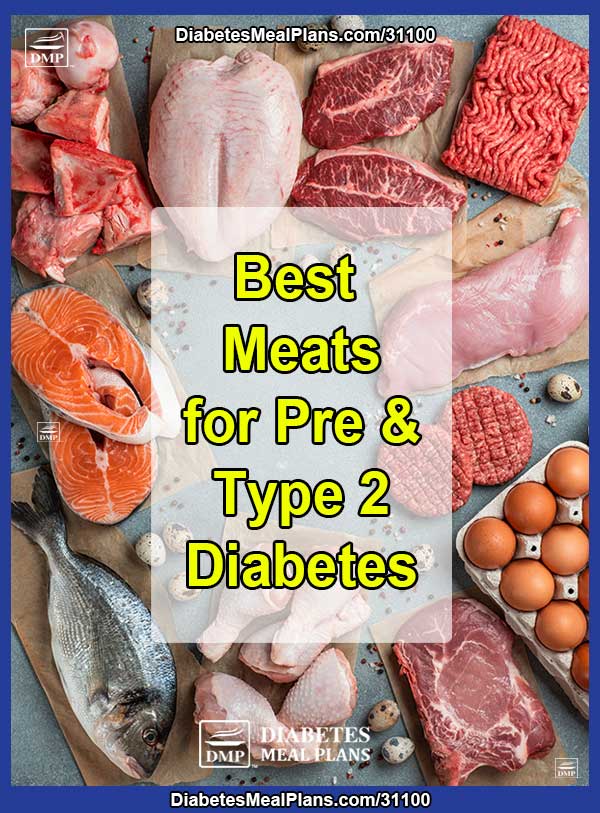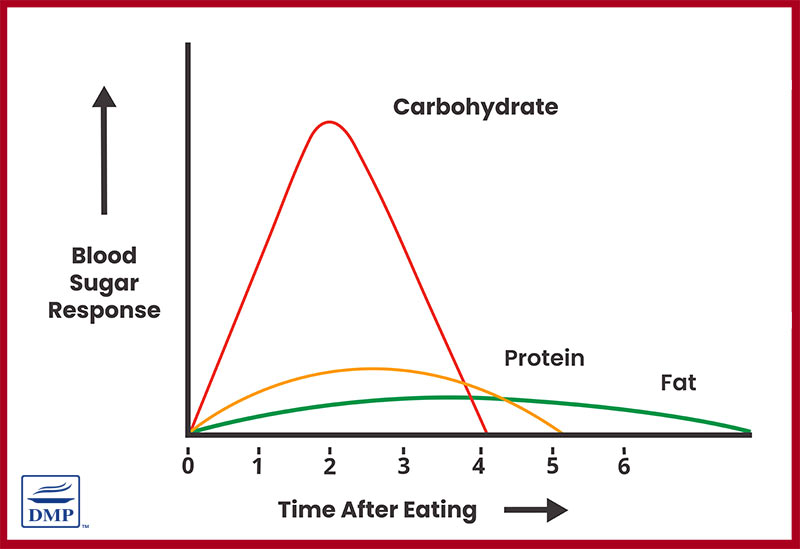When it comes to meat and type 2 diabetes or prediabetes, there are always many questions:
- Is it healthy for people with diabetes to eat meat?
- How does eating meat impact blood sugar?
- Are some meats better for you than others?
- Should I avoid eating red meat with diabetes?
If you’ve been curious about this yourself, we’re about to answer these questions (and more). Let’s dig in…

The Great Meat Myth: Is Saturated Fat the Enemy?
One statement that you may have heard in passing is that “meat is unhealthy.”
If you ask why meat is so bad, you’ll probably get an ear-full about how meat is chock full of saturated fat, which causes heart disease.
Is this really true?
The truth is: no, meat is not inherently unhealthy.
However, overindulging in processed meats, can be pretty bad for you.
There’s a lot of processed junk meat around – hot dogs at baseball games, sugar-soaked deli meats, corn dogs, sugary breakfast sausages, frozen breaded chicken tenders, and fast food hamburgers.
Highly processed meats often contain inflammatory trans-fats and are linked to negative health outcomes such as increased cancer risk, obesity, inflammation, and yes, heart disease.
But take note that these outcomes are associated with processed meats – these typically contain added sugars, salts, cooking oils, preservatives, among other things. These are not clean “whole food” meats.
The point being, unprocessed meats are not linked to increased disease risk.
Now let’s mention the myth about saturated fat, specifically.
Research does not point to saturated fat as a direct cause of heart disease!
Yes, that’s a myth that keeps being perpetuated.
There is absolutely no reasonable explanation or research to suggest we should fear fat from natural whole food sources. It is all just a perpetuating myth we need to forget about.
It’s the processed foods you want to look out for, not whole food sources of saturated fat, or meat in general.

Benefits of Meat for Diabetes
Micronutrients in Meat
Vitamins don’t just come from fruits and vegetables.
While plants tend to contain lots of antioxidants like vitamin C and beta-carotene, animal protein is often rich in a different set of nutrients.
Vitamins and minerals like vitamin D, iron, zinc, and vitamin B12 are abundant in meat, especially red meat. Vegetarians and vegans often have to supplement these nutrients due to their meatless diets.
Of course, you’ll want to include enough low-carb sources of fiber like non-starchy vegetables, nuts, and seeds in your diet too, but having meat regularly won’t hurt you…in fact, it may help you!
Meat and Blood Sugar Regulation
People with insulin resistance and diabetes benefit when they focus on blood sugar regulation; this goal usually steers them towards a diet that includes meat.
Along with fiber, protein and fat have a stabilizing effect on blood sugar. Compared to carbohydrates, proteins cause blood sugar levels to increase more slowly and steadily than carbs do. Fats have little to no impact on blood sugar and they help maintain blood sugar at an even keel for hours after a meal.

The stabilizing effect of protein may be why research repeatedly shows that a high-protein diet (including meat) is beneficial for people with diabetes.
Protein is also more satiating for the appetite, which means you feel fuller longer and you don’t feel hungry all the time.
Best Meat for Diabetes
The best kind of meat for people with diabetes to enjoy is a variety of unprocessed meats. Fresh, natural whole food sources of meat!
Poultry
You can’t go wrong with a main dish of roast poultry at dinner. Chicken and turkey also make great additions to salad, soups, bakes, and stir-fries due to their mild flavor.

Want to get more creative with your poultry? Try roast duck!
Duck has a much richer, heartier flavor and it really shines in traditional Chinese cuisine like Peking duck and ginger duck (served on a bed of lower carb cauliflower rice, of course).
Red Meats
Red meat isn’t just another term for “beef.” The red meat category includes a variety of meats from different sources. You may want to check around to local butcher shops to see if organic meat options are available.

Check out a few of the options we recommend:
- Beef: Ground beef, steak, brisket, rib, and roast are great sources of healthy fat and protein.
- Pork: Pork chop, pork belly, and bacon are popular cuts. Pork has a great flavor and works well in stir-fries, taco salad, stews or just on its own with a side of vegetables. Feel free to enjoy the occasional serving of bacon but look for low-sugar, less processed options.
- Lamb: Lamb is popular in Mediterranean, Central Asian, Middle East, and Australian cuisine. Experiment with different cuts like shank, shoulder, leg of lamb, rack of lamb (spine), and lamb chop.
- Venison & wild game: If you’re a hunter or you have access to wild game in stores, then consider yourself lucky! You have access to a whole new range of meats to cook with. “Wild game” will vary depending on where you live. In the U.S., venison (deer) is popular, but elk, caribou, bison, pheasant, quail, wild boar, grouse, rabbit, and even alligator may be available to you depending on location.
MYTH: People often think red meat is loaded with saturated fat. While it does contain more saturated fat than some other foods, it may come as a surprise that red meat contains more monounsaturated heart-healthy fat, than it does saturated fat.

Nutrition Facts; 3.5oz/100g beef steak, with visible fat eaten
250 cal/ 1046 kj
0g carbs
26.7g protein
15.1g fat
- Monounsaturated fat 6.4g
- Saturated fat 6.0g
- Polyunsaturated fat 0.6g
Fish & Seafood
Let’s move from turf to surf and explore the wonderful world of seafood.
Known for its strong flavors and heart healthy omega-3 fats, seafood is well-loved all across the world.
If you want to move beyond the classics like salmon, tilapia, halibut, tuna, and cod, take a look at the list seafood options below.
Which do you want to try?
- Fish: Catfish, anchovies, flounder, haddock, bluefish, swordfish
- Crustacean: Crab, crayfish, shrimp, prawns, lobster
- Shellfish: Clams, mussels, oysters, scallops, sea snail (escargot)
- Other: Squid, caviar/roe (fish eggs)
Organic, wild caught fish tend to have the most nutrients and fewer added dyes and flavors than farmed fish, so when you can, go for wild caught. Canned fish can be a fast and easy option too.

Organ Meats
This one is for the adventurous eaters!
Areas where organ meats aren’t as popular are really missing out – organ meats can be absolutely delicious plus they’re rich in the fat soluble vitamins A, D, E, and K, as well as vitamin B-12.
Not sure where to start?
Beginners can branch out by adding organ meats like kidney, liver, tongue, and heart to a pan of ground beef. With a ratio of 70% beef to 30% organ meat, you’ll hardly notice the difference!
Adding organ meat to dishes that already have a strong flavor is a good way to start out. Tomato sauce-based and heavily spiced dishes conceal the new and unique meat flavor, making it more palatable to beginners.
Those ready for “advanced mode” can experiment with adding organ meats to Vietnamese pho, Thai or Indian curry, and hearty soups with strong flavor like chili. You can also make or purchase traditional German sausage containing organ meats.
Conclusion
The types of meats diabetics can eat include all types of poultry (chicken, turkey, duck), meats (beef, lamb, pork, venison, wild game), all types of fish and seafood, and organ meats (kidney, liver, tongue, brains).
Basically, all types of natural whole food sources of meat can be safely eaten by people with type 2 diabetes and prediabetes, so feel free to include a wide variety of meats in your weekly menu.
These are nutrient dense foods that provide a range of valuable vitamins and minerals, along with satiating protein and fat.
Processed meats like bacon, pepperoni, deli sausage and other processed meats are fine occasionally, just keep in mind they are processed meats so they aren’t a great everyday meat option.

Kenneth
Iam was not sure what to eat unit I read this my blood sugar stay out of range all the time my A1c alway 7and above
Dr Jedha
Glad it helped Kenneth. You can eat a lot of different foods and delicious meals and if you focus on your nutrition, you will be able to get your blood sugar in range and A1c below 7, so keep at it! And if you ever need more help, consider joining us as a member.
Peggy Johnson
Very interesting… different than what always told, stay away from red meats and organ meats…
Dr Jedha
Common advice Peggy, but unfortunately, not backed by any scientific evidence.
Abder
How about beef and lamb’s triples??
Thanks in advance
Dr Jedha
Perfectly fine to eat beef and lamb tripe Abder, zero carbs in those.
Abder
thanks for the tip
Joe Cerda
Thank you for the info. I have currently been diagnosed with diabetes type 2. I am trying to fix it with lifestyle changes. Further more, I am a open heart patient and need to be on a low fat low cholesterol diet.
Dr Jedha - Nutritionist (PhD)
You might find some of this info good reading Joe.